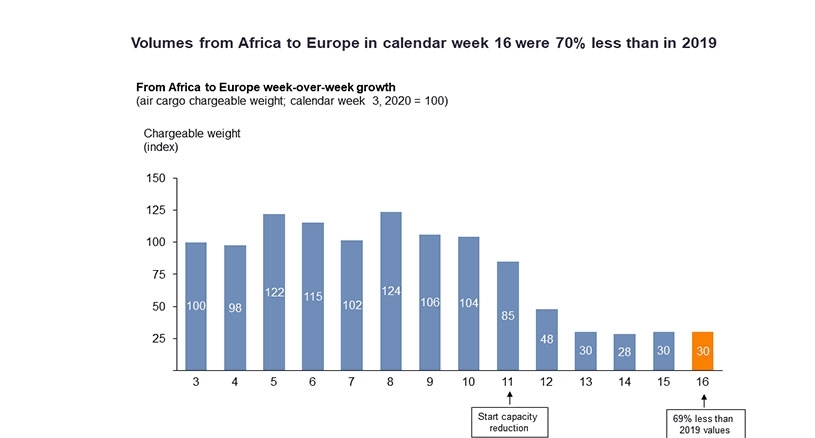African air cargo industry witnesses 70% capacity dip to European markets: TIACA
The International Air Cargo Association (TIACA) has raised its concern on the air cargo sector in Africa which has experienced a significant drop in capacity to Europe by 70 percent compared to 2019.

April 28, 2020: The International Air Cargo Association (TIACA) has raised its concern on the air cargo sector in Africa which has experienced a significant drop in capacity to Europe by 70 percent compared to 2019, according to CLIVE Data Services. Despite the vital role this activity plays in providing people with basic necessities and essential medical equipment, the situation is very concerning on the continent. TIACA is calling on all stakeholders – institutional and private alike – to take action without delay to contain this phenomenon.
“We are encouraging African airlines to respond to capacity requirements immediately, in particular by putting passenger freighter systems in place, such as those implemented by airlines including Ethiopian Airlines, Kenya Airways, SAA, and RwandAir,” said Sanjeev Gadhia, TIACA vice chairman and CEO of Astral Aviation. “Collaboration and cooperation between African airlines across their respective fleets and networks are both essential so we can overcome the challenges we are facing.”
According to Gadhia, a concrete example is the drop in capacity has resulted in a capacity crisis in Nairobi for its perishables exports to Europe from 5,000 tonnes to 1,800 tonnes per week, which will have disastrous effects on the agriculture sector in Kenya, which is yet to recover from the Covid-19 pandemic.
TIACA calls on the air cargo community in Africa to rise up to the challenge by formulating a recovery plan that will enable it to sustain the shocks of the pandemic which will require a collaborative strategy between the airlines, airports, handlers, forwarders, and shippers.
TIACA also calls on African governments and on civil aviation authorities (CAAs) to take immediate measures to support the aviation sector and the economy, by cushioning them against the impact of the pandemic and in particular:
- Airport closures due to lockdown, closure or curfew measures.
- Quarantining of crews in certain African airports and the need to standardize crew quarantine requirements, including by providing dedicated rest areas.
- Lifting the night bans affecting the move of ground staff.
- Restrictions and limitations on cargo flights in certain African countries.
- Simplifying procedures and easing the clearance for goods like pharma and food.
- Fumigation requirements put in place in multiple African countries.


